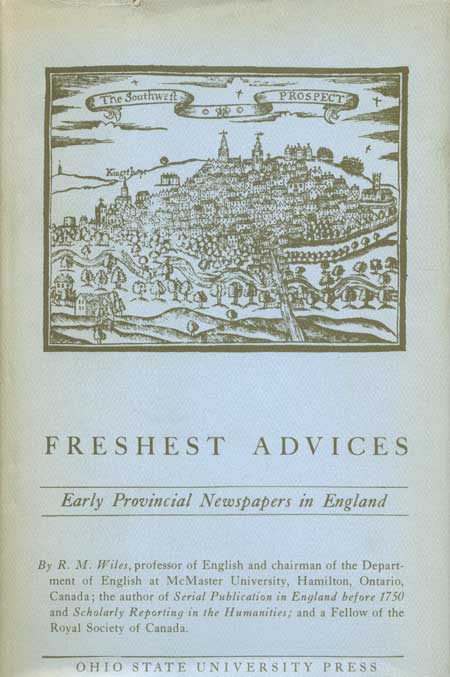Freshest AdvicesEarly Provincial Newspapers in EnglandR. M. Wiles |
 1965 555 pp. 6x9 • | |||
|
read the full text of this book • |
When Princess Anne was crowned Queen of her several realms in 1702, there were
only two provincial newspapers in England to report the coronation. When, two
generations later, another Archbishop placed the crown on the head of George
III, there were local weekly newspapers in twenty-nine English towns. Between
these two events, during the reigns of Anne and the first two Georges, scores
and scores of newspaper sprang into being in country towns all over England.
This book gives an account of that rapid development in early journalism. The significance of the phenomenon was recognized by very few people at the time. Even so astute an observer as Samuel Johnson saw only the fact; he was not aware that a mighty struggle was in progress, the struggle of a force that burst its way into the open, thrusting aside all impediments, gaining momentum steadily, and bringing a new dimension into the life of England. An examination of the papers themselves provides the modern reader not only with an account of the provincial press in its formative years but also with an incredible abundance of material on every aspect of life in a swiftly developing nation. For in them are revealed what political and economic questions were of chief concern to their thousands of readers, what incidents in the normal day-to-day life of people were thought to be worth reporting, what kinds of prose and verse the local papers disseminated throughout England’s fifty thousand square miles, and what efforts were made by printers to keep the public informed about events in other parts of the nation and of the world. When compared with the stately official papers in Great Britain’s archives, these ephemeral and hastily produced weekly bulletins of news may seem pathetically unimportant as historical documents; yet their numerous details of fact and speculation disclose, perhaps more strikingly than any other body of evidence, the ethos of early Georgian provincial England. The author has assimilated a prodigious mass of detail to write, with grace
and humor, a definitive study of an important aspect of eighteenth-century
publishing history. R. M. Wiles is professor of English at McMaster
University. He is the author of Serial Publication in England before 1750
and Scholarly Reporting in the Humanities and is a Fellow of the Royal
Society of Canada. | |||

